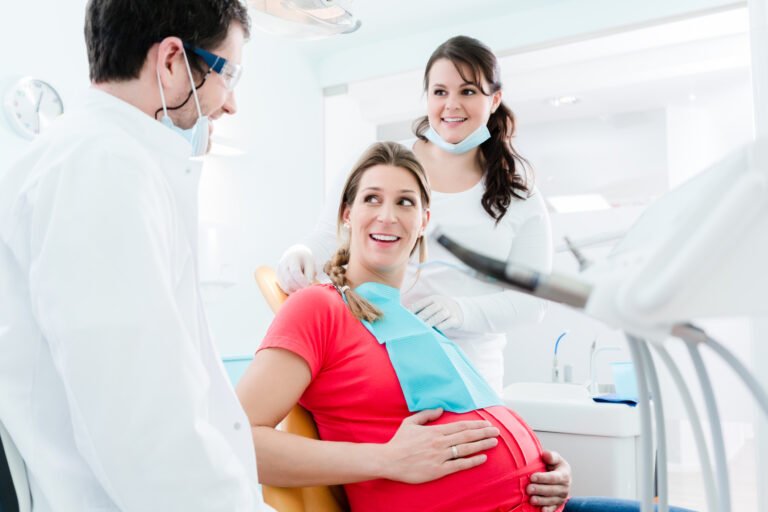By Beth Conover, APRN, CGC MotherToBaby Nebraska, UNMC
“There are so many risks to the baby if I go in for dental work, right?” “What about the x-rays?” “I don’t like going to the dentist anyway, so I’ll probably wait until my baby is born. It should be fine, right?’ Worries, excuses, we’ve heard it all at MotherToBaby when it comes to dental work during pregnancy. We often get questions from women who wonder if dental care is safe. In short, the answer is… yes! What better time to talk about why it’s okay than June – usually the month the American Dental Association calls “Oral Health Month.”
Routine dental care is low risk and most emergency procedures can be done as well.
Good oral health improves your overall health and increases your chances of a good pregnancy outcome. However, when you schedule a dental appointment and you’re pregnant (or trying to get pregnant), let the office know so they’re ready to make decisions about which procedures are safe for your baby. In some cases, you or your dentist may want to wait until after delivery for elective (unnecessary) procedures.
Here are some common questions we get from pregnant women:
- When I brush my teeth, my gums have started bleeding. Is this normal? What should I do;
Bleeding gums are a common problem during pregnancy. Pregnant women have hormonal changes that can increase their chances of developing gum problems such as gingivitis (swollen and tender red gums that bleed easily). Your dentist will want to monitor this so that it doesn’t develop into more serious gum disease. Periodontal disease is a bacterial infection of the gums and jawbones that support the teeth, and it can increase your chances of having a smaller baby, giving birth prematurely, and having other pregnancy complications. Dentists recommend that you floss daily and brush your teeth regularly during pregnancy (consider doing this more often if you have pregnancy gingivitis).
- It looks like pregnancy makes me have more cavities in my teeth…am I right?
Pregnancy can contribute to women having more cavities. This is partly due to changes in diet, such as frequent snacking, including sugary foods. To prevent tooth decay, eat a healthy diet and brush your teeth after eating sweets. Additionally, if you have morning sickness, the acid from your stomach can affect your tooth enamel and make cavities more likely. Rinse your mouth with water or mouthwash after morning sickness episodes. If your toothpaste makes your morning sickness worse, ask your dentist about the name of a mildly flavored toothpaste.
- What if I need a cavity filled or a tooth pulled? Can I have a local anesthetic?
Agents such as lidocaine injected into your gums are low risk for your baby. In one study, researchers compared pregnant women who received lidocaine injections as part of dental treatment with women who did not receive injections, and found no significant increase in the risk of miscarriage, prematurity, or birth defects. If you need a pain medication, your dentist will take into account where you are in your pregnancy to make a choice that is safest for your baby.
- Are dental x-rays safe in pregnancy?
You can choose to have routine x-rays before pregnancy or delay them until after you give birth – talk to your dentist about the best options for you. However, if you have an urgent dental problem and need to do it, don’t hesitate. Advances in technology have made dental x-rays safer and involve little or no radiation. Your dentist will cover your neck and abdomen with a lead apron, which further reduces your baby’s exposure.
- What else can I do to ensure dental health?
Schedule a visit to your dentist before you become pregnant. Clean teeth, examine gums and treat any dental problems before pregnancy.
Brush your teeth at least twice a day and floss once a day. This helps reduce plaque, the sticky film that covers your teeth and can cause gum inflammation and increase your risk for periodontal disease.
I hope I’ve given you some good chewing tips – your teeth and baby will thank you. Have a healthy pregnancy!
Beth Conover, APRN, CGC, is a genetic counselor and pediatric nurse. She founded the Nebraska Teratogen Information Agency in 1986, also known as MotherToBaby Nebraska. He was also a founding member of the Organization for Special Teratology Information (OTIS). In her clinical practice, Beth sees patients in the Pharmacogenetics Clinic and Genetics Clinic at the University of Nebraska Medical Center. Beth has consulted with the FDA and CDC.
About MotherToBaby
MotherToBaby is a service of the Organization for Special Teratology Information (OTIS), a recommended resource from many agencies, including the Centers for Disease Control and Prevention (CDC). If you have questions about exposures during pregnancy and breastfeeding, call MotherToBaby TOLL FREE at 866-626-6847 or try MotherToBaby’s new text information service by sending questions to (855) 999-3525. You can also visit MotherToBaby.org to browse a library of newsletters about dozens of viruses, drugs, vaccines, alcohol, diseases or other exposures during pregnancy and breastfeeding, or connect to all of our resources by downloading the new free MotherToBaby app, available on Android and iOSmarkets.
